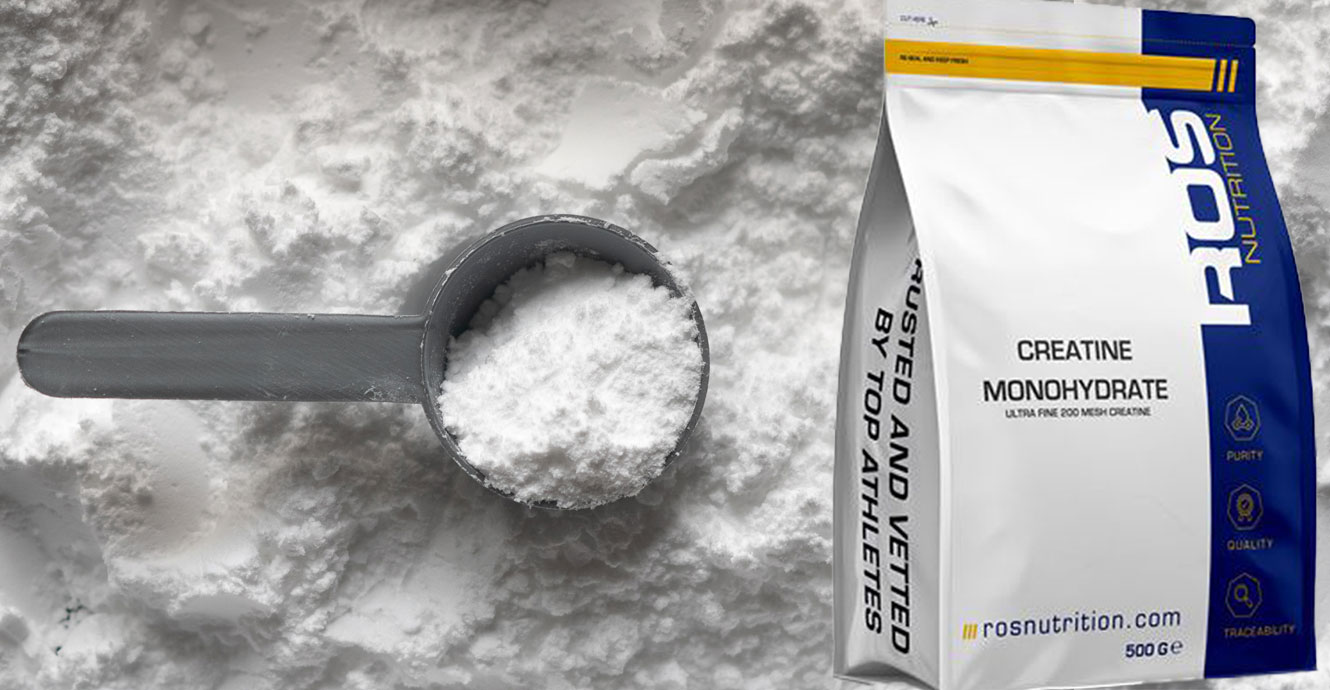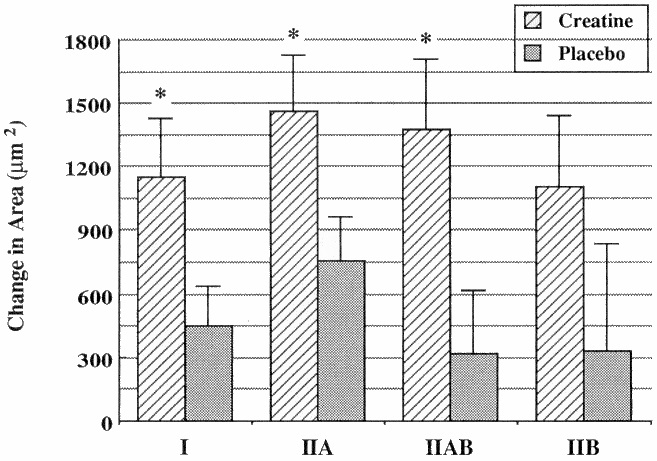We use cookies to make your experience better. To comply with the new e-Privacy directive, we need to ask for your consent to set the cookies. Learn more.
Benefits of Creatine Monohydrate

What is Creatine?
Creatine is an amino acid located mostly in your body's muscles and the brain. Your body stores creatine as phosphocreatine primarily in your muscles, where it is used for energy. Most people get creatine through seafood and red meat, though at much smaller levels than those found in creatine supplements. The body's liver, pancreas and kidneys also can make about 1 gram of creatine per day (1). Because of these low levels, many people choose to supplement their diet with creatine.
Supplementation
Creatine is one of the most well-researched supplements on the market. It’s not only safe, but also one of the world’s most popular and effective supplements for building muscle and strength (2).
Creatine supplements are marketed in ethyl ester, gluconate, monohydrate, and nitrate forms. The vast majority of the more than 1,000 studies on creatine have focused on the monohydrate form.
At ROS Nutrition, our Creatine Monohydrate is batch-tested to WADA standards, so it’s suitable for use by top level athletes.
Some studies suggest that total muscle creatine is significantly lower in vegetarians than non-vegetarians. This finding has been postulated to be due to an omnivorous diet being the primary source of creatine. Research shows that supplementation is needed to raise lacto-ovo vegetarian or vegan muscle creatine concentrations up to non-vegetarian levels (3).
Benefits of Creatine
Research has shown many benefits of taking creatine, including (4):
1. Added muscle mass
Creatine is widely known for its effectiveness for adding muscle mass (5).
Taking it for as few as 5–7 days has been shown to significantly increase lean body weight and muscle size. This initial rise is caused by increases in the water content of your muscles, known as cell volumization, and can quickly increase the appearance of muscles (6). Over the long term, it aids in muscle growth by boosting the formation of proteins that create new muscle fiber (7).
In one comprehensive study of a 6-week training regimen, participants who supplemented with creatine added 4.4 pounds (2 kg) more muscle mass than the control group (8). Another study showed that creatine supplementation also enhanced muscle morphology in response to heavy resistance training, presumably mediated via higher quality training sessions (9). The graph below demonstrates the changes in size of different types of muscle fibers following creatine supplementation.

Creatine supplements can also raise levels of insulin-like growth factor 1 (IGF-1), a hormone that promotes increases in muscle mass (10). Additionally, some research has shown that creatine decreases levels of myostatin, a molecule responsible for stunting muscle growth. In this way, reducing myostatin can lead to building muscle faster (11).
2. Helps energy production in muscles
Time to get technical! Creatine supplements increase your muscles’ phosphocreatine stores. Phosphocreatine aids in the formation of adenosine triphosphate (ATP), the key molecule your cells use for energy as well as all basic life functions.
During exercise, ATP is broken down to produce energy. The rate of ATP resynthesis limits your ability to continually perform at maximum intensity, as you use ATP faster than you reproduce it. Creatine supplements increase your phosphocreatine stores, allowing you to produce more ATP energy to fuel your muscles during high-intensity exercise such as reps or sprints, leading to greater gains in strength, muscle mass and performance (12).
3. Improves high-intensity exercise performance
Creatine’s direct role in ATP production means it can really improve high-intensity exercise performance (13).
A 2018 review article in the Journal of the International Society of Sports Nutrition reiterated that supplementing with creatine monohydrate may help with energy availability for high-intensity exercise (14). Creatine supplements can increase maximum power and performance in high-intensity anaerobic repetitive work by 5 to 15% (15).
Creatine can improve numerous factors, including:
- strength
- ballistic power
- sprint ability
- muscle endurance
- resistance to fatigue
- recovery
One review found that creatine supplementation can improve high-intensity exercise performance by up to 15% (16). Unlike supplements that only affect elite athletes, creatine benefits you regardless of your fitness level (17).
4. Injury prevention
Taking a creatine supplement may also assist in the prevention of injury and recovery from injury. One reason for this is that creatine increases cellular metabolism which helps prevent tissue damage, especially in cases where oxygen availability is compromised, such as high-intensity training.
Also, the increasing availability of creatine in tissue may enhance cellular metabolism, thereby lessening the severity of injury, particularly when oxygen availability is compromised (18). This is because creatine might reduce the frequency of dehydration, muscle cramping, and injuries to the muscles, bones, ligaments, tendons and nerves.
5. Cognition and brain health
Creatine supplementation might also improve cognitive performance, especially in older adults.
Taking a creatine supplement has been shown to increase levels of creatine in the brain by 5–15%, leading in turn to increased oxygen delivery and energy supply, which may improve brain function (19).
An interesting review of 6 studies involving 281 healthy people looked at the effects of taking creatine supplements on particular aspects of brain function. In particular, it found that taking 5–20 grams daily for a period of 5 days to 6 weeks may improve short-term memory and intelligence or reasoning (20).
Some people have suggested that taking these supplements may slow cognitive decline linked to neurodegenerative diseases, such as Parkinson’s and Huntington’s disease. However, research in humans has failed to find any benefits and more study is needed (21).
Potential adverse effects
As with any supplementation, adverse side effects may occur in certain individuals. Although they are uncommon, side effects of creatine consumption may include (22):
- Weight gain due to extra water retention to the muscle (23)
- Potential muscle cramps / strains / pulls
- Upset stomach
- Diarrhea
- Dizziness
Please consult your doctor or health professional if you are unsure about supplementation or have any underlying health issues.
Get Creatine Monohydrate
Our Creatine is batch-tested to WADA standards which makes this product suitable for top level athletes. Nothing has been added to this Creatine Monohydrate so you know you are getting the best quality powder.
Get yours here: https://www.rosnutrition.com/ie/product/creatine-monohydrate
References
- https://www.mayoclinic.org/drugs-supplements-creatine/art-20347591#
- Buford TW, Kreider RB, Stout JR, et al. International Society of Sports Nutrition position stand: creatine supplementation and exercise. J Int Soc Sports Nutr. 2007;4:6. Published 2007 Aug 30. doi:10.1186/1550-2783-4-6
- Burke DG, Chilibeck PD, Parise G, Candow DG, Mahoney D, Tarnopolsky M (November 2003). "Effect of creatine and weight training on muscle creatine and performance in vegetarians". Medicine and Science in Sports and Exercise.
- https://www.mayoclinic.org/drugs-supplements-creatine/art-20347591#
- Branch JD. Effect of creatine supplementation on body composition and performance: a meta-analysis. Int J Sport Nutr Exerc Metab. 2003 Jun;13(2):198-226. doi: 10.1123/ijsnem.13.2.198. PMID: 12945830.
- Häussinger D, Roth E, Lang F, Gerok W. Cellular hydration state: an important determinant of protein catabolism in health and disease. Lancet. 1993 May 22;341(8856):1330-2. doi: 10.1016/0140-6736(93)90828-5. PMID: 8098459.
- Deldicque L, Theisen D, Bertrand L, Hespel P, Hue L, Francaux M. Creatine enhances differentiation of myogenic C2C12 cells by activating both p38 and Akt/PKB pathways. Am J Physiol Cell Physiol. 2007 Oct;293(4):C1263-71. doi: 10.1152/ajpcell.00162.2007. Epub 2007 Jul 25. PMID: 17652429.
- Francaux M, Poortmans JR. Effects of training and creatine supplement on muscle strength and body mass. Eur J Appl Physiol Occup Physiol. 1999 Jul;80(2):165-8.
- Volek JS, Duncan ND, Mazzetti SA, Staron RS, Putukian M, Gómez AL, Pearson DR, Fink WJ, Kraemer WJ. Performance and muscle fiber adaptations to creatine supplementation and heavy resistance training. Med Sci Sports Exerc. 1999 Aug;31(8):1147-56.
- Schiaffino S, Mammucari C. Regulation of skeletal muscle growth by the IGF1-Akt/PKB pathway: insights from genetic models. Skelet Muscle. 2011;1(1):4. Published 2011 Jan 24. doi:10.1186/2044-5040-1-4
- Saremi A, Gharakhanloo R, Sharghi S, Gharaati MR, Larijani B, Omidfar K. Effects of oral creatine and resistance training on serum myostatin and GASP-1. Mol Cell Endocrinol. 2010 Apr 12;317(1-2):25-30. doi: 10.1016/j.mce.2009.12.019. Epub 2009 Dec 22. PMID: 20026378.
- Balsom PD, Söderlund K, Sjödin B, Ekblom B. Skeletal muscle metabolism during short duration high-intensity exercise: influence of creatine supplementation. Acta Physiol Scand. 1995 Jul;154(3):303-10. doi: 10.1111/j.1748-1716.1995.tb09914.x. PMID: 7572228.
- Aaserud R, Gramvik P, Olsen SR, Jensen J. Creatine supplementation delays onset of fatigue during repeated bouts of sprint running. Scand J Med Sci Sports. 1998 Oct;8(5 Pt 1):247-51. doi: 10.1111/j.1600-0838.1998.tb00478.x. PMID: 9809381.
- Kerksick CM, Wilborn CD, Roberts MD, Smith-Ryan A, Kleiner SM, Jäger R, et al. (August 2018). "ISSN exercise & sports nutrition review update: research & recommendations". Journal of the International Society of Sports Nutrition.
- Bemben MG, Lamont HS (2005). "Creatine supplementation and exercise performance: recent findings". Sports Medicine. 35 (2): 107–25. doi:10.2165/00007256-200535020-00002
- Kreider RB. Effects of creatine supplementation on performance and training adaptations. Mol Cell Biochem. 2003 Feb;244(1-2):89-94. PMID: 12701815.
- McNaughton LR, Dalton B, Tarr J. The effects of creatine supplementation on high-intensity exercise performance in elite performers. Eur J Appl Physiol Occup Physiol. 1998 Aug;78(3):236-40. doi: 10.1007/s004210050413. PMID: 9721002.
- Kreider RB, Stout JR. Creatine in Health and Disease. Nutrients. 2021 Jan 29;13(2):447. doi: 10.3390/nu13020447. PMID: 33572884; PMCID: PMC7910963.
- Dechent P, Pouwels PJ, Wilken B, Hanefeld F, Frahm J. Increase of total creatine in human brain after oral supplementation of creatine-monohydrate. Am J Physiol. 1999 Sep;277(3):R698-704. doi: 10.1152/ajpregu.1999.277.3.R698. PMID: 10484486.
- Avgerinos KI, Spyrou N, Bougioukas KI, Kapogiannis D. Effects of creatine supplementation on cognitive function of healthy individuals: A systematic review of randomized controlled trials. Exp Gerontol. 2018;108:166-173. doi:10.1016/j.exger.2018.04.013
- Writing Group for the NINDS Exploratory Trials in Parkinson Disease (NET-PD) Investigators, Kieburtz K, Tilley BC, Elm JJ, Babcock D, Hauser R, Ross GW, Augustine AH, Augustine EU, Aminoff MJ, Bodis-Wollner IG, Boyd J, Cambi F, Chou K, Christine CW, Cines M, Dahodwala N, Derwent L, Dewey RB Jr, Hawthorne K, Houghton DJ, Kamp C, Leehey M, Lew MF, Liang GS, Luo ST, Mari Z, Morgan JC, Parashos S, Pérez A, Petrovitch H, Rajan S, Reichwein S, Roth JT, Schneider JS, Shannon KM, Simon DK, Simuni T, Singer C, Sudarsky L, Tanner CM, Umeh CC, Williams K, Wills AM. Effect of creatine monohydrate on clinical progression in patients with Parkinson disease: a randomized clinical trial. JAMA. 2015 Feb 10;313(6):584-93
- Francaux M, Poortmans JR (December 2006). "Side effects of creatine supplementation in athletes". International Journal of Sports Physiology and Performance.
- Kreider RB, Kalman DS, Antonio J, Ziegenfuss TN, Wildman R, Collins R, et al. (13 June 2017). "International Society of Sports Nutrition position stand: safety and efficacy of creatine supplementation in exercise, sport, and medicine". Journal of the International Society of Sports Nutrition.

